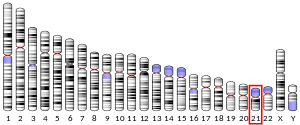TCP10L
T-complex protein 10A homolog 2 is a protein that in humans is encoded by the TCP10L gene.[3][4]
It is located next to C21orf59.
References
- 1 2 3 GRCh38: Ensembl release 89: ENSG00000242220 - Ensembl, May 2017
- ↑ "Human PubMed Reference:".
- ↑ Hattori M, Fujiyama A, Taylor TD, Watanabe H, Yada T, Park HS, Toyoda A, Ishii K, Totoki Y, Choi DK, Groner Y, Soeda E, Ohki M, Takagi T, Sakaki Y, Taudien S, Blechschmidt K, Polley A, Menzel U, Delabar J, Kumpf K, Lehmann R, Patterson D, Reichwald K, Rump A, Schillhabel M, Schudy A, Zimmermann W, Rosenthal A, Kudoh J, Schibuya K, Kawasaki K, Asakawa S, Shintani A, Sasaki T, Nagamine K, Mitsuyama S, Antonarakis SE, Minoshima S, Shimizu N, Nordsiek G, Hornischer K, Brant P, Scharfe M, Schon O, Desario A, Reichelt J, Kauer G, Blocker H, Ramser J, Beck A, Klages S, Hennig S, Riesselmann L, Dagand E, Haaf T, Wehrmeyer S, Borzym K, Gardiner K, Nizetic D, Francis F, Lehrach H, Reinhardt R, Yaspo ML (Jun 2000). "The DNA sequence of human chromosome 21". Nature. 405 (6784): 311–9. PMID 10830953. doi:10.1038/35012518.
- ↑ "Entrez Gene: TCP10L t-complex 10 (mouse)-like".
Further reading
- Maruyama K, Sugano S (1994). "Oligo-capping: a simple method to replace the cap structure of eukaryotic mRNAs with oligoribonucleotides.". Gene. 138 (1-2): 171–4. PMID 8125298. doi:10.1016/0378-1119(94)90802-8.
- Suzuki Y, Yoshitomo-Nakagawa K, Maruyama K, et al. (1997). "Construction and characterization of a full length-enriched and a 5'-end-enriched cDNA library.". Gene. 200 (1-2): 149–56. PMID 9373149. doi:10.1016/S0378-1119(97)00411-3.
- Strausberg RL, Feingold EA, Grouse LH, et al. (2003). "Generation and initial analysis of more than 15,000 full-length human and mouse cDNA sequences.". Proc. Natl. Acad. Sci. U.S.A. 99 (26): 16899–903. PMC 139241
 . PMID 12477932. doi:10.1073/pnas.242603899.
. PMID 12477932. doi:10.1073/pnas.242603899.
- Chen Z, Yu L, Wu H, et al. (2004). "Identification of a novel liver-specific expressed gene, TCP10L, encoding a human leucine zipper protein with transcription inhibition activity.". J. Hum. Genet. 48 (11): 556–63. PMID 14586771. doi:10.1007/s10038-003-0075-6.
- Ota T, Suzuki Y, Nishikawa T, et al. (2004). "Complete sequencing and characterization of 21,243 full-length human cDNAs.". Nat. Genet. 36 (1): 40–5. PMID 14702039. doi:10.1038/ng1285.
- Jiang DJ, Yu HX, Hexige SY, et al. (2004). "Human liver specific transcriptional factor TCP10L binds to MAD4.". J. Biochem. Mol. Biol. 37 (4): 402–7. PMID 15469726. doi:10.5483/bmbrep.2004.37.4.402.
- Gerhard DS, Wagner L, Feingold EA, et al. (2004). "The status, quality, and expansion of the NIH full-length cDNA project: the Mammalian Gene Collection (MGC).". Genome Res. 14 (10B): 2121–7. PMC 528928
 . PMID 15489334. doi:10.1101/gr.2596504.
. PMID 15489334. doi:10.1101/gr.2596504.
- Yu H, Jiang D, Guo Z, et al. (2005). "TCP10L is expressed specifically in spermatogenic cells and binds to death associated protein kinase-3.". Int. J. Androl. 28 (3): 163–70. PMID 15910542. doi:10.1111/j.1365-2605.2005.00522.x.
- Rual JF, Venkatesan K, Hao T, et al. (2005). "Towards a proteome-scale map of the human protein-protein interaction network.". Nature. 437 (7062): 1173–8. PMID 16189514. doi:10.1038/nature04209.
 . PMID 12477932. doi:10.1073/pnas.242603899.
. PMID 12477932. doi:10.1073/pnas.242603899. . PMID 15489334. doi:10.1101/gr.2596504.
. PMID 15489334. doi:10.1101/gr.2596504.
